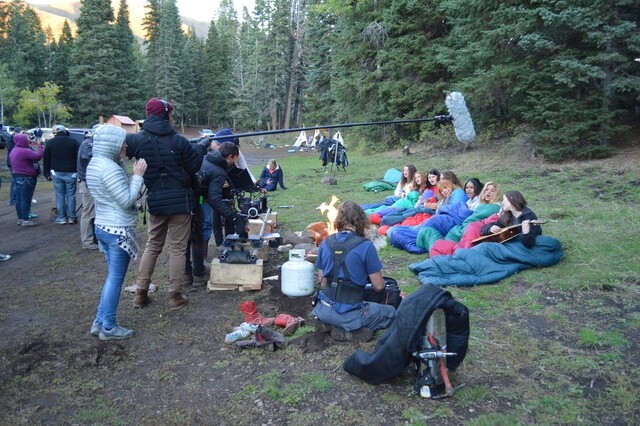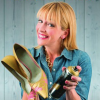Paris is not a Mormon and plays a non-Mormon teenager while Kaley is not a Mormon and plays a Mormon teenager in the upcoming film, Once I Was a Beehive (in theaters August 14th). On the other hand, I’m a self-described “super Mormon-y Mom” who plays a super Mormon-y woman in the film. But even though we come from different backgrounds, we all learned something from coming together to make a movie. And we’re all excited about sharing it with the world.
I chatted with Paris and Kaley about what it was like, not having a background in the LDS religion and being thrown into the world of a Mormon girls’ camp cameras rolling:
What were your expectations about working on the set of an LDS-themed movie?
Paris: I didn’t really know what to expect. I knew I would learn a lot about the religion and what it stood for. In other situations, I kinda felt isolated in spaces where I wasn’t part of the main religion. But you guys made an effort to make me feel included. I never felt like I was on the outside or not wanted. I felt included and loved.
Kaley: I don’t really know if I had expectations about it being LDS more than I was concerned with doing good work with good people. After reading the script, I felt encouraged and moved by it. I felt like the bar was set so high and my thought was I have to learn, and I have to do good work. I have to embrace the new and learn about a new religion. And I wanted to learn what Mormon culture is from not just from looking it up on Wikipedia. I wanted to come into this film with an open heart because I thought, “We really have to do a good job here.”

Paris, you played the main character, Lane. What was that like?
Paris: It was very much like playing myself. She’s a nonmember going to LDS Girls’ Camp. I went into it knowing as much as Lane did. When I was acting surprised, I was really surprised. She was an easy character to relate to. I’ve had big losses in my life, and her going through that was like me going through it in the sense of what she was dealing with at camp. I also think everyone fits their character! Everyone seemed to really be their character in real life—it was perfectly cast.
And you, Kaley? You’re not Mormon, but you play a Mormon girl, Mindy, in this movie. How much did you relate to her?
Kaley: At first I didn’t think I related to her at all! She’s quirky, weird, is always goofing off, and doesn’t stop talking. Then, on set, I realized I’m her! I’m just like her! I love to laugh, I love to be creative and have the freedom to be silly. As you get older, you judge yourself and hold back. Playing her—playing freely and restlessly was such a gift! Granted, we’re a little different [in the movie]. I mean, I probably wouldn’t wear pajamas the entire time I was at camp, but it was freeing dressing like that!
Kaley, did you do anything to prepare for the role or connect with your Mormon character?
Kaley: Being raised Christian helped me connect to the movie in a lot of ways. Faith was a through-line in the movie, which it has been in my everyday life too. I count on my faith to get me through every unknown, every obstacle. Faith also helps me to celebrate the not–so-tough moments too. It’s the only thing that makes me feel better when I just don’t know. When I [am fearful] or feel lost, alone, or doubtful, I find my comfort in talking to God and trusting that He has me. Also, going to a Christian camp (as a youth) made it super easy for me to relate to this particular “Girls’ Camp.” Sitting around the fire during the testimonial scene reminded me of a 16-year-old me, surrounded by friends who supported my beliefs and my journey. It was the safest place for me to say my inner truths and feel validated when speaking them.

What's one thing that surprised you about working on this kind of project?
Paris: Well, I don’t know. How long the song “Mormon Boy” can be stuck in your head. Uh! It’s still stuck in my head!
Kaley: How seamless the energy and chemistry [was] that was created between all of us cast and crew. We just felt like family. Like we’ve known each other for years. We all like each other. So I guess that was the biggest surprise for me—how much we became family and how we think of everyone like that. If I needed anyone, if I were alone and crying and had no one to talk to, I could call any of [the cast or crew members]and have that. And there wasn’t one person on the set that I didn’t feel that way about. Anyone and everyone. It was just a really huge sense of family. And I don’t know if I’ll feel that way in another project. I hope I do.
What was your favorite part of the filming process?
Paris: The testimony scene was just…I felt at that point in our filming process that everyone had gotten a chance to connect with each other and there was so much love. During that scene, everyone was crying because of how close they felt to everyone and I felt it was great to film because it was real. We all really felt that love. It was beautiful.
Kaley: The times we weren’t shooting, just sitting around were my favorite which is the actor’s worst nightmare, right? Hurry up and wait. But that’s what made the movie. Behind the scenes, we were at camp—we were getting to know each other, playing “would you rather” or “truth or dare” or just talking. Getting to know everyone and doing what was going on in the script behind the script. And, because I was wearing pajamas the whole time, I had free range of the snack table. That was the first time on set that that’s ever happened. Usually it’s “Oh, I shouldn’t have those M&M’s, those cheeseballs…”Nope, free range of the snack table! That was beauty and freedom, to eat like a 15-year-old, not a bird. It was fantastic.
What do you hope people take away as the overall message of the movie?
Paris: That love and acceptance is a very powerful thing in any setting.
Kaley: I hope the overall message is whatever religious affiliation you have, even if it’s nothing, is to love and just love. It’s the greatest gift we’ve been given. And if we could do it a little more, we’d be saving our own lives, and our world. We just have to welcome each other. It’s so cliché to say “with no judgment,” but we don’t know each other’s story. We have to be open-minded and not persecute each other. Love and not judge, and accept. I learned this on set. You and I are both Christians and we believe some similar things, but not all, but I never once felt judged or put upon. I never felt a barrier. And I think the movie will give people that idea. Extend a hand. If we could just do that, we could save a lot of hearts.

Is there anything else you want to say about filming Once I Was a Beehive?
Kaley: You know, I guess when I came back from doing a “Mormon movie,” people had a lot of questions with a lot of judgment. They’d ask, “Was it weird?” And I felt very defensive, like a mama bear. I’d answer, “Why would you think that? Because those are stereotypes!” I was so flabbergasted by that. None of them had a clue. I wanted to tell them I was just with the most giving, loving people I’ve ever been around in my life. I just felt so hugged on that set—like one big hug—so coming home, there was this big defense to me. This is the problem in society—we judge what we don’t know. And I have to learn each day not to do that. I make a judgement every day. So when I came home and had to defend it for someone else, I was reminded of that. In my personal life, it affected me and I was surprised by that.
What is your reaction to people now, when they ask you about working with Mormons?
Kaley: I don’t even joke. I truly say in a confident voice, “No, you don’t get it. These people are about love and giving.” The morale of the LDS community was really strong and there’s this ride–or-die energy, like banding together, and it’s just uplifting and you want to be a part of it. You want to be on that ship—on that lifeboat, because regardless, you’re going to have a good time. Barta, in the movie, says it, “We don’t care if you’re part of this church. When you’re with us, you’re family.” It gives me chills and makes me cry just thinking about that scene. It’s exactly how I felt filming that—we’re family. I didn’t feel for a single second that I couldn’t call any one of [the cast members]. And I felt that on day two. And that’s special. It’s crazy how that stuff ends up being spiritual. It’s an acting job! When people ask me, “Are you excited for the movie to come out?” I think, well, the exciting stuff already happened.
Paris: I loved every minute of it. It was a really cool experience and it felt like I was actually experiencing the real thing. I was Lane. And I basically went to Girl’s Camp!
Do you feel like a Beehive?
Paris: Yeah, I feel like once I was a Beehive.
Preview the upcoming movie here:
Author’s note: Interviewing Paris and Kaley for this article reminded me how much I learned from both of them on set, personally. At the beginning of filming, as a producer and Mormon, I was so concerned about everyone having a positive experience on set that I forgot that I wasn’t the only one who was invested in that goal. These women, and others on set were great examples to me of inclusivity, faith, and love.
We love Lisa Valentine Clark's newest book, Real Moms: Making It Up as We Go. As moms, we improvise. And we make a lot of things up as we go along because, let’s face it, no manual is ever going to cover all the bases a real mom needs to touch. But if laughter and perspective and a renewed energy to face the day are what you’re after—if you too are a “real mom”—this is the book for you!
-->Read about other moms making it up as they go!






